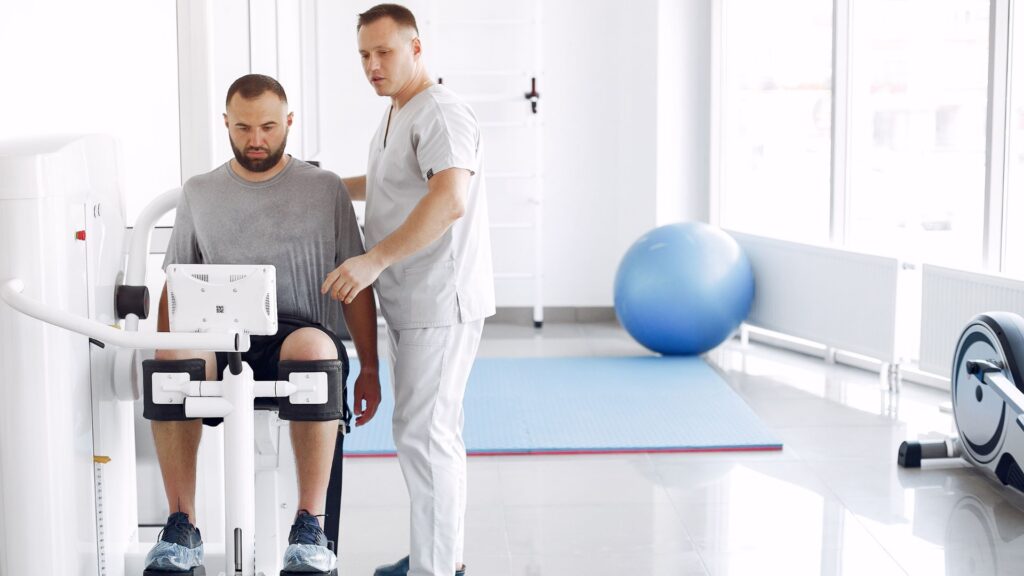
Have you ever heard about physiotherapy? Every year, a huge number of people suffer from chronic pain, especially back pain. In back pain alone, eight of ten women and men have at some degree experienced this ailment. Bizarre right? Back pain comes with injuries, challenges in achieving mobility, managing chronic aches, abilities to do after surgery and so much more.
This is where physiotherapy comes in to compensate for these grave issues. Pain can be mitigated, motion can be restored, and life can be improved – thanks to physiotherapy and its available targeted techniques. There are tremendous benefits of physiotherapy.
In this blog post, we will perform an in-depth analysis aimed at maximizing the advantages of physiotherapy. We will also discuss the benefits of physiotherapy, highlighting its common practices, key benefits, and overall impact on health.
What is Physiotherapy?
Physical therapy is a field that treats a multitude of problems including but not limited to physical dysfunctions, movement problems, etc. It effectively aids in managing chronic pain while enhancing overall mobility. The most important part is reviving the senses of the patients who are paralyzed whether due to a brain stroke or any other incidences. Physiotherapy is for all, and elevated wellness is a boon.

Physiotherapy helps in enhancing mobility, treating physical dysfunctions, and increasing strength as well as general wellness. On the contrary, it avoids inflicting pain or injury due to excessive stretching or flexibility.
Some common techniques carried out during physical therapy include specific movements aimed at increasing one’s range of motion through body stretch, several hot and cold therapies that aim at improving joint motion, and electrical stimulation therapy that focuses mostly on alleviating pain and restoring the functioning of the muscles.
Most Common Reasons for Physical Therapy
What is physical therapy? Physiotherapy and physical therapy refer to the same practice, just known by different names. So don’t let confusion take place. Physical therapy identifies weak muscles and works on them through several methods. Now, let us dive into the most common reasons for physical therapy.
Injury Recovery:
It is prevalent that Physiotherapists primarily work on injuries like fractures, sprains, and sports-related damages. Although they spend almost 30% of their time dealing with sprains or sports injuries, it is essential to have the benefits of physiotherapy for back pain in your approach. Don’t hold back! Suitable rehabilitation that meets your needs can heal your wound beyond your imagination.

Chronic Pain Management:
It is now a common issue all over the world. Wherever you see, you will see chronic pain take place, whether it is Arthritis, lower back pain, or fibromyalgia. Physiotherapy helps to dig deeper, tackling the problem solely from the root. It supports joint mobility and muscle functions. Studies show that over 70% of patients experience relief from regular physiotherapy.
Post-Surgical Rehabilitation:
Have you heard about ligaments before? A ligament is a tissue incredibly responsible for connecting one bone to another. Many sports people usually suffer from these issues. The role of physiotherapy here is crucial. Physiotherapy is compulsory if you have undergone any surgery for more extended well-being.
It also supports building strength, increases mobility, and fetches you into your daily life more easily. According to many studies, People with knee surgery can reduce their recovery time by 30% with the help of certified physiotherapists.
Mobility and Balance Improvement:
We all have seen paralyzed patients at any stage of our lives who completely lost their mobility. Mobility can be severely impacted, Whether it is brain stroke, Parkinson’s, or any age-related issues. Physiotherapy works on these issues depending on a few factors. If you are an older adult older than 70, it will take a bit extra time.
According to the CDC, one out of every four elderly individuals aged 65 and older falls each year, often due to mobility and balance issues. Here, the benefits of physiotherapy for older people are essential. Physiotherapy can significantly eliminate this risk by strength training and a few specific balance exercises.

Key Benefits of Physiotherapy
There are numerous benefits of physiotherapy. You have already seen a few of them, as we discussed above. It enhances your health conditions in many ways and increases well-being. Now, let us look at some of the critical benefits of physiotherapy to improve your knowledge of this. So, hold yourself on the chair for the next few minutes.
Pain Management
Physiotherapy can reduce both your severe and chronic pain. Some pain can be alleviated by medicine, while others can be alleviated through physical therapy. Although, it takes time to heal the acute pain. Chronic pain, on the flip side, takes three to twelve months. Before concluding it at a specific time, you need to go to the root to identify the exact reason for your pain.
Anyone can get their desired health through targeted exercises, manual therapy, and electrotherapy. Studies have shown that lower back pain can be reduced by 92% only by physiotherapy.
Avoiding Surgery
You can avoid surgery by taking physiotherapy sessions unless it is an emergency. While you have already addressed musculoskeletal issues and reinforced your health towards natural healing, surgical needs might be needless. Some research indicates that meniscal tears avoided surgery by 79% through tailored physiotherapy plans. It is entirely safe, cost-effective, and has many benefits. Remember, it takes time, but it is worth the wait.

Improving Mobility and Balance
As we already discussed in the earlier section, It is one of the crucial reasons for this. Here, physiotherapy offers a holistic approach to make you better than before. It is vital to increase mobility, flexibility, and overall physical condition. Both target muscle strength and joint movement exercises can give you freedom like before.
Balance training is necessary for older persons, and strength training can be applied to dangerous patients to bring the desired strength. Balance training indeed eliminates the fall risks amongst the elderly, as the CDC cited it as one of the main reasons for fatal injury.
Recovery from Injury or Trauma
The most common reason for seeking physiotherapy as a treatment. It does not matter if it is a car accident, sports-related issues, or a fall. Personalized rehabilitation plans can get you out of all these injuries. You can get rid of sports injuries by consistent physiotherapy sessions. You might have seen every sports team has a physiotherapist. I hope you realize the importance of physiotherapy.

Management of Age-Related Issues
Physiotherapy is very effective in treating chronic conditions associated with old age such as arthritis, knee and joint pain, bone density problems, and so forth. It helps you to sustain bone density (or tackles arthritic and osteoporosis problems) and also goes a long way in making one more active than before. Also, important are the benefits of physiotherapy for stroke patients, since they help to restore the mobility and strength of the individual. Some studies show that when individuals reach the age of 50, one out of every two will have osteoporosis. Regular engagement in physiotherapy will undoubtedly have a significant impact on your well-being.
Support for Chronic Conditions
Many people have chronic conditions like heart disease, COPD, or diabetes. They can benefit greatly from physiotherapy. Physiotherapy improves cardiovascular health, respiratory efficiency, and overall physical endurance. There is also a program called pulmonary rehabilitation that may be useful. I am excited to inform you that it can reduce hospital admissions by 36% for COPD patients. You may understand how effective physiotherapy is.
Enhancing Athletic Performance
Athletes often go to physiotherapists to enhance their performance and post-injury treatment. Some critical areas to focus on include muscle conditioning, flexible exercises, and post-injury care. With the help of practical techniques, athletes usually achieve the desired performance.
Occupational therapy vs physiotherapy
Occupational therapy(OT) and physiotherapy have benefits but differ in well-being.
Occupational Therapy
Occupational therapy (OT) will suit you if you want something to boost your everyday activity performance. It focuses on learning the essential skills to tackle daily activities without hassles. Occupational therapy (OT) teaches you to dress correctly, especially after a brain stroke or other neurological problems. Adapt your workspace as necessary or make sure to present yourself professionally. In the US alone, 54% of stroke or neurological survivors need OT to get back to their daily life activities.
Physiotherapy
Conversely, physiotherapy emphasizes flexibility, body strength, and pain reduction, enhancing movement and balance. The techniques of physiotherapy are considered adequate to treat musculoskeletal and neurological conditions. Research shows that physiotherapy helps athletes recover from ligament injuries and improves their performance. This applies not just to athletes but also to seniors struggling with arthritis, joint pain, or mobility challenges.
Key Differences
Focus: If you seek to improve, adapt, and accomplish your daily tasks, then Ot is for you. Physiotherapy is for body functions and mobility.
Goals: OT provides independence in daily life, whereas physiotherapy offers pain relief and rehabilitation.
Approach: OT helps you to be adaptive, while Physiotherapy is for physical exercise, manual therapy, and electrotherapy.
Populations Served: OT serves people daily, and physiotherapy helps you recover from your injury and improve mobility.
Final Thoughts
The benefits of physiotherapy range from effective pain management and injury recovery to improved mobility, flexibility, and overall physical function. Not only all these, but they also help with future injury prevention.
Physiotherapy addresses chronic pain. It assists older individuals with age-related issues. It also helps athletes improve their performance. Engaging in physiotherapy can lead to a better quality of life. Whether you are recovering from an injury, dealing with chronic pain, facing elderly-related issues, or recovering from surgery, physiotherapy can be beneficial. A consistent approach to physiotherapy can contribute to a better life.

